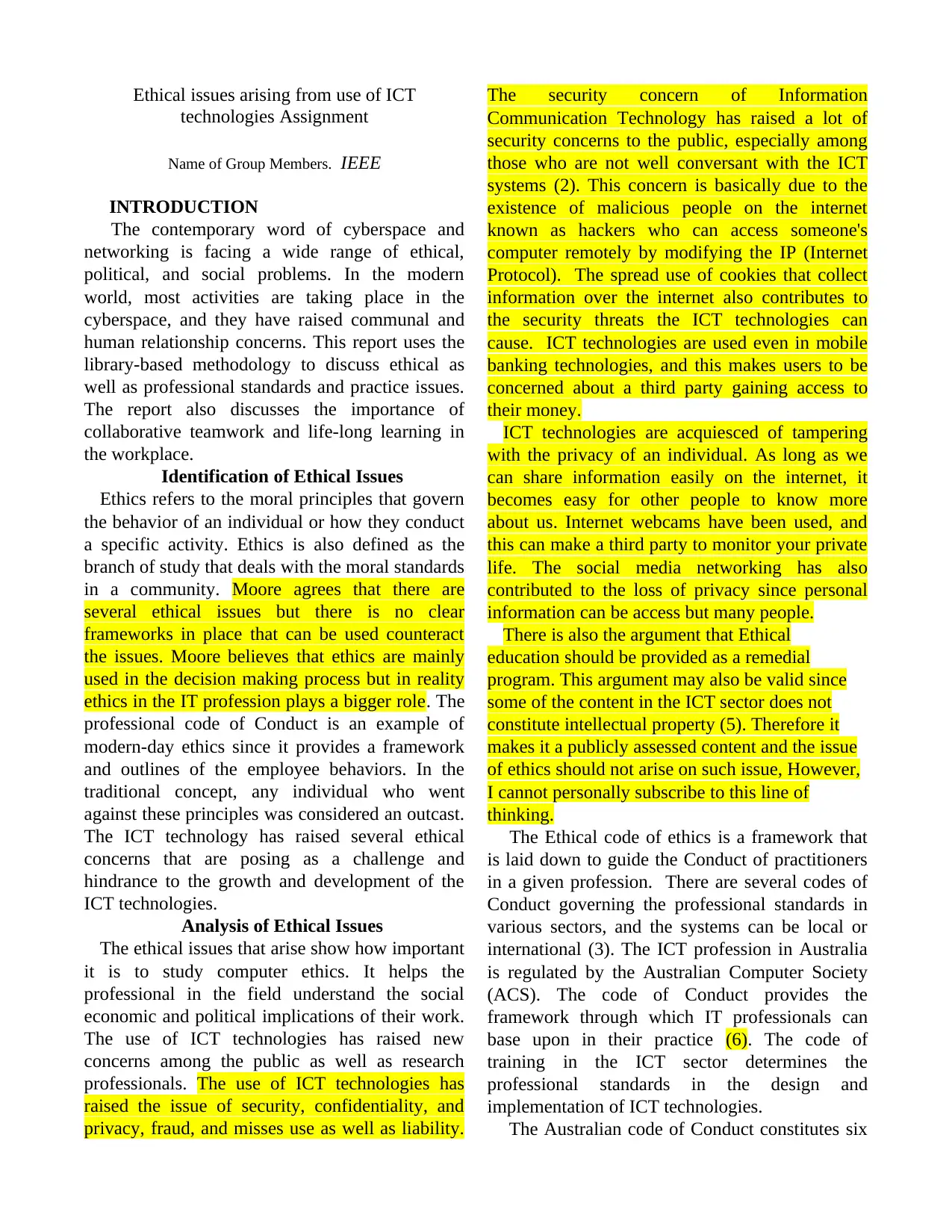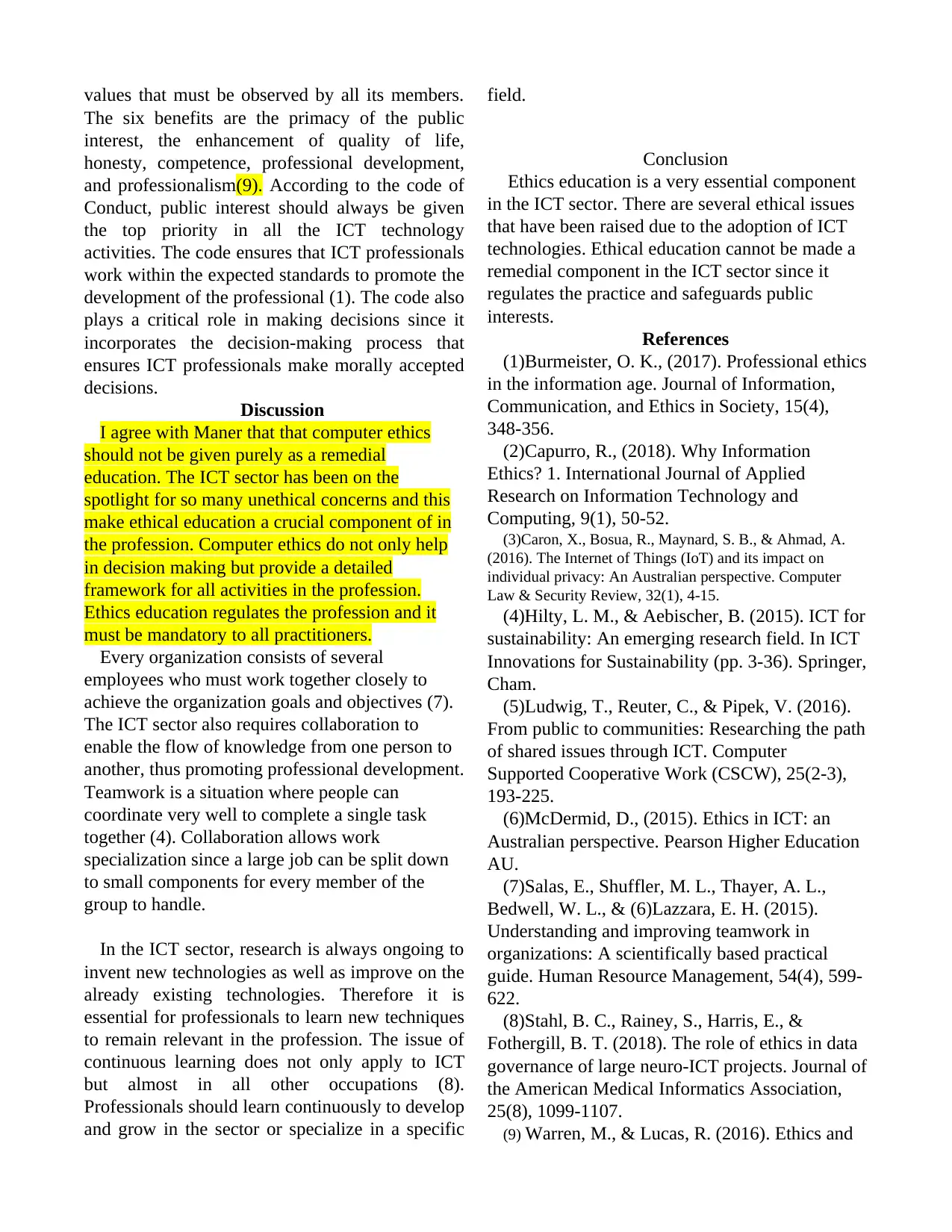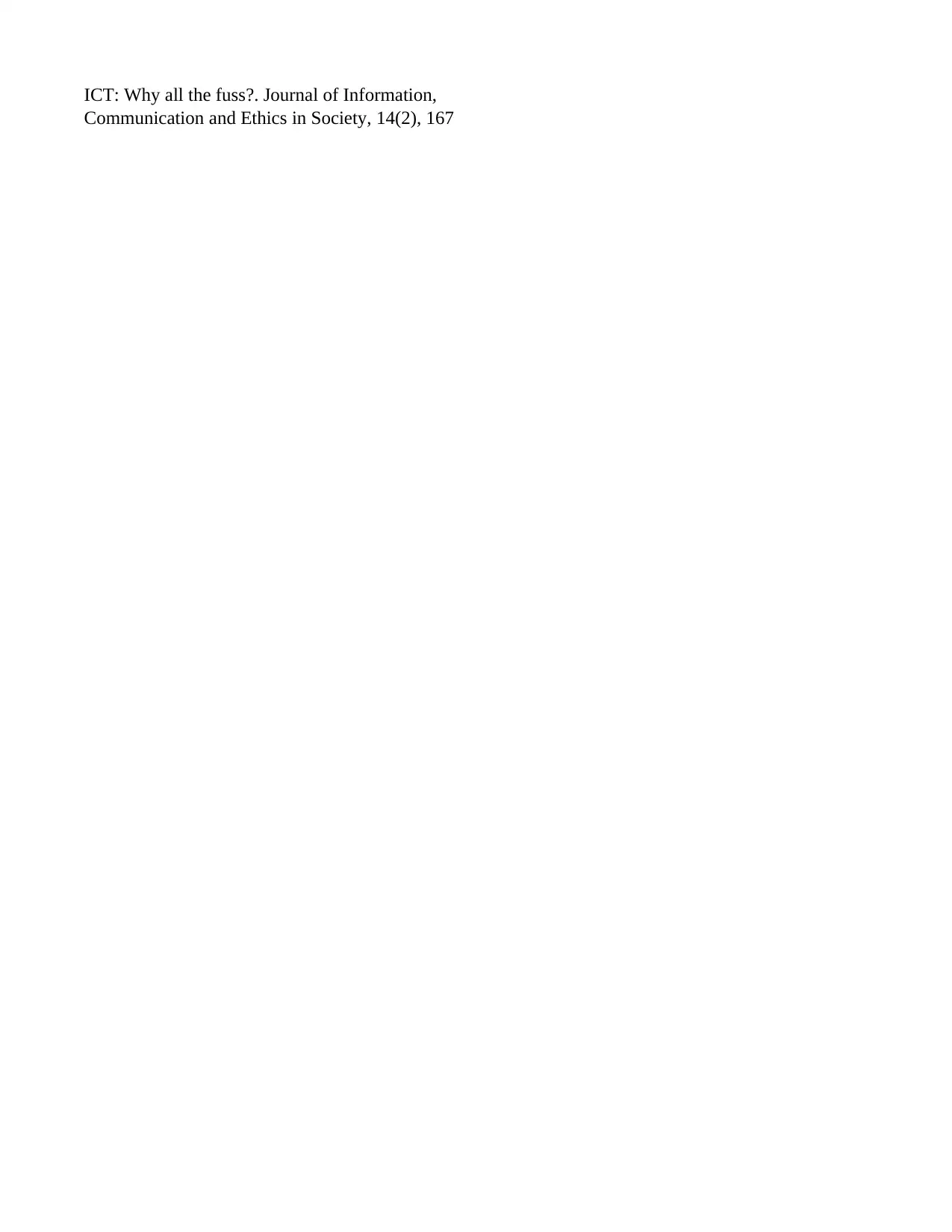MN501 Group Report: Ethical Issues from ICT Technologies
VerifiedAdded on 2022/11/24
|3
|1522
|445
Report
AI Summary
This report delves into the ethical issues arising from the use of Information and Communication Technology (ICT) technologies. It examines various ethical concerns, including security, confidentiality, privacy, fraud, misuse, and liability. The report highlights the importance of ethical education and professional codes of conduct, particularly referencing the Australian Computer Society (ACS) code. It emphasizes the significance of teamwork, collaboration, and lifelong learning in the ICT sector to address these challenges and promote professional development. The report discusses the need for continuous learning to stay relevant in the field and the importance of ethical frameworks in guiding the conduct of ICT professionals. The report also provides a detailed overview of the ethical considerations in the modern cyberspace and networking, and how these concerns impact communal and human relationships. The report uses a library-based methodology and provides a comprehensive analysis of ethical issues, professional standards, and the importance of teamwork and continuous learning within the ICT industry. The report references various sources to support its arguments and conclusions.

Ethical issues arising from use of ICT
technologies Assignment
Name of Group Members. IEEE
INTRODUCTION
The contemporary word of cyberspace and
networking is facing a wide range of ethical,
political, and social problems. In the modern
world, most activities are taking place in the
cyberspace, and they have raised communal and
human relationship concerns. This report uses the
library-based methodology to discuss ethical as
well as professional standards and practice issues.
The report also discusses the importance of
collaborative teamwork and life-long learning in
the workplace.
Identification of Ethical Issues
Ethics refers to the moral principles that govern
the behavior of an individual or how they conduct
a specific activity. Ethics is also defined as the
branch of study that deals with the moral standards
in a community. Moore agrees that there are
several ethical issues but there is no clear
frameworks in place that can be used counteract
the issues. Moore believes that ethics are mainly
used in the decision making process but in reality
ethics in the IT profession plays a bigger role. The
professional code of Conduct is an example of
modern-day ethics since it provides a framework
and outlines of the employee behaviors. In the
traditional concept, any individual who went
against these principles was considered an outcast.
The ICT technology has raised several ethical
concerns that are posing as a challenge and
hindrance to the growth and development of the
ICT technologies.
Analysis of Ethical Issues
The ethical issues that arise show how important
it is to study computer ethics. It helps the
professional in the field understand the social
economic and political implications of their work.
The use of ICT technologies has raised new
concerns among the public as well as research
professionals. The use of ICT technologies has
raised the issue of security, confidentiality, and
privacy, fraud, and misses use as well as liability.
The security concern of Information
Communication Technology has raised a lot of
security concerns to the public, especially among
those who are not well conversant with the ICT
systems (2). This concern is basically due to the
existence of malicious people on the internet
known as hackers who can access someone's
computer remotely by modifying the IP (Internet
Protocol). The spread use of cookies that collect
information over the internet also contributes to
the security threats the ICT technologies can
cause. ICT technologies are used even in mobile
banking technologies, and this makes users to be
concerned about a third party gaining access to
their money.
ICT technologies are acquiesced of tampering
with the privacy of an individual. As long as we
can share information easily on the internet, it
becomes easy for other people to know more
about us. Internet webcams have been used, and
this can make a third party to monitor your private
life. The social media networking has also
contributed to the loss of privacy since personal
information can be access but many people.
There is also the argument that Ethical
education should be provided as a remedial
program. This argument may also be valid since
some of the content in the ICT sector does not
constitute intellectual property (5). Therefore it
makes it a publicly assessed content and the issue
of ethics should not arise on such issue, However,
I cannot personally subscribe to this line of
thinking.
The Ethical code of ethics is a framework that
is laid down to guide the Conduct of practitioners
in a given profession. There are several codes of
Conduct governing the professional standards in
various sectors, and the systems can be local or
international (3). The ICT profession in Australia
is regulated by the Australian Computer Society
(ACS). The code of Conduct provides the
framework through which IT professionals can
base upon in their practice (6). The code of
training in the ICT sector determines the
professional standards in the design and
implementation of ICT technologies.
The Australian code of Conduct constitutes six
technologies Assignment
Name of Group Members. IEEE
INTRODUCTION
The contemporary word of cyberspace and
networking is facing a wide range of ethical,
political, and social problems. In the modern
world, most activities are taking place in the
cyberspace, and they have raised communal and
human relationship concerns. This report uses the
library-based methodology to discuss ethical as
well as professional standards and practice issues.
The report also discusses the importance of
collaborative teamwork and life-long learning in
the workplace.
Identification of Ethical Issues
Ethics refers to the moral principles that govern
the behavior of an individual or how they conduct
a specific activity. Ethics is also defined as the
branch of study that deals with the moral standards
in a community. Moore agrees that there are
several ethical issues but there is no clear
frameworks in place that can be used counteract
the issues. Moore believes that ethics are mainly
used in the decision making process but in reality
ethics in the IT profession plays a bigger role. The
professional code of Conduct is an example of
modern-day ethics since it provides a framework
and outlines of the employee behaviors. In the
traditional concept, any individual who went
against these principles was considered an outcast.
The ICT technology has raised several ethical
concerns that are posing as a challenge and
hindrance to the growth and development of the
ICT technologies.
Analysis of Ethical Issues
The ethical issues that arise show how important
it is to study computer ethics. It helps the
professional in the field understand the social
economic and political implications of their work.
The use of ICT technologies has raised new
concerns among the public as well as research
professionals. The use of ICT technologies has
raised the issue of security, confidentiality, and
privacy, fraud, and misses use as well as liability.
The security concern of Information
Communication Technology has raised a lot of
security concerns to the public, especially among
those who are not well conversant with the ICT
systems (2). This concern is basically due to the
existence of malicious people on the internet
known as hackers who can access someone's
computer remotely by modifying the IP (Internet
Protocol). The spread use of cookies that collect
information over the internet also contributes to
the security threats the ICT technologies can
cause. ICT technologies are used even in mobile
banking technologies, and this makes users to be
concerned about a third party gaining access to
their money.
ICT technologies are acquiesced of tampering
with the privacy of an individual. As long as we
can share information easily on the internet, it
becomes easy for other people to know more
about us. Internet webcams have been used, and
this can make a third party to monitor your private
life. The social media networking has also
contributed to the loss of privacy since personal
information can be access but many people.
There is also the argument that Ethical
education should be provided as a remedial
program. This argument may also be valid since
some of the content in the ICT sector does not
constitute intellectual property (5). Therefore it
makes it a publicly assessed content and the issue
of ethics should not arise on such issue, However,
I cannot personally subscribe to this line of
thinking.
The Ethical code of ethics is a framework that
is laid down to guide the Conduct of practitioners
in a given profession. There are several codes of
Conduct governing the professional standards in
various sectors, and the systems can be local or
international (3). The ICT profession in Australia
is regulated by the Australian Computer Society
(ACS). The code of Conduct provides the
framework through which IT professionals can
base upon in their practice (6). The code of
training in the ICT sector determines the
professional standards in the design and
implementation of ICT technologies.
The Australian code of Conduct constitutes six
Paraphrase This Document
Need a fresh take? Get an instant paraphrase of this document with our AI Paraphraser

values that must be observed by all its members.
The six benefits are the primacy of the public
interest, the enhancement of quality of life,
honesty, competence, professional development,
and professionalism(9). According to the code of
Conduct, public interest should always be given
the top priority in all the ICT technology
activities. The code ensures that ICT professionals
work within the expected standards to promote the
development of the professional (1). The code also
plays a critical role in making decisions since it
incorporates the decision-making process that
ensures ICT professionals make morally accepted
decisions.
Discussion
I agree with Maner that that computer ethics
should not be given purely as a remedial
education. The ICT sector has been on the
spotlight for so many unethical concerns and this
make ethical education a crucial component of in
the profession. Computer ethics do not only help
in decision making but provide a detailed
framework for all activities in the profession.
Ethics education regulates the profession and it
must be mandatory to all practitioners.
Every organization consists of several
employees who must work together closely to
achieve the organization goals and objectives (7).
The ICT sector also requires collaboration to
enable the flow of knowledge from one person to
another, thus promoting professional development.
Teamwork is a situation where people can
coordinate very well to complete a single task
together (4). Collaboration allows work
specialization since a large job can be split down
to small components for every member of the
group to handle.
In the ICT sector, research is always ongoing to
invent new technologies as well as improve on the
already existing technologies. Therefore it is
essential for professionals to learn new techniques
to remain relevant in the profession. The issue of
continuous learning does not only apply to ICT
but almost in all other occupations (8).
Professionals should learn continuously to develop
and grow in the sector or specialize in a specific
field.
Conclusion
Ethics education is a very essential component
in the ICT sector. There are several ethical issues
that have been raised due to the adoption of ICT
technologies. Ethical education cannot be made a
remedial component in the ICT sector since it
regulates the practice and safeguards public
interests.
References
(1)Burmeister, O. K., (2017). Professional ethics
in the information age. Journal of Information,
Communication, and Ethics in Society, 15(4),
348-356.
(2)Capurro, R., (2018). Why Information
Ethics? 1. International Journal of Applied
Research on Information Technology and
Computing, 9(1), 50-52.
(3)Caron, X., Bosua, R., Maynard, S. B., & Ahmad, A.
(2016). The Internet of Things (IoT) and its impact on
individual privacy: An Australian perspective. Computer
Law & Security Review, 32(1), 4-15.
(4)Hilty, L. M., & Aebischer, B. (2015). ICT for
sustainability: An emerging research field. In ICT
Innovations for Sustainability (pp. 3-36). Springer,
Cham.
(5)Ludwig, T., Reuter, C., & Pipek, V. (2016).
From public to communities: Researching the path
of shared issues through ICT. Computer
Supported Cooperative Work (CSCW), 25(2-3),
193-225.
(6)McDermid, D., (2015). Ethics in ICT: an
Australian perspective. Pearson Higher Education
AU.
(7)Salas, E., Shuffler, M. L., Thayer, A. L.,
Bedwell, W. L., & (6)Lazzara, E. H. (2015).
Understanding and improving teamwork in
organizations: A scientifically based practical
guide. Human Resource Management, 54(4), 599-
622.
(8)Stahl, B. C., Rainey, S., Harris, E., &
Fothergill, B. T. (2018). The role of ethics in data
governance of large neuro-ICT projects. Journal of
the American Medical Informatics Association,
25(8), 1099-1107.
(9) Warren, M., & Lucas, R. (2016). Ethics and
The six benefits are the primacy of the public
interest, the enhancement of quality of life,
honesty, competence, professional development,
and professionalism(9). According to the code of
Conduct, public interest should always be given
the top priority in all the ICT technology
activities. The code ensures that ICT professionals
work within the expected standards to promote the
development of the professional (1). The code also
plays a critical role in making decisions since it
incorporates the decision-making process that
ensures ICT professionals make morally accepted
decisions.
Discussion
I agree with Maner that that computer ethics
should not be given purely as a remedial
education. The ICT sector has been on the
spotlight for so many unethical concerns and this
make ethical education a crucial component of in
the profession. Computer ethics do not only help
in decision making but provide a detailed
framework for all activities in the profession.
Ethics education regulates the profession and it
must be mandatory to all practitioners.
Every organization consists of several
employees who must work together closely to
achieve the organization goals and objectives (7).
The ICT sector also requires collaboration to
enable the flow of knowledge from one person to
another, thus promoting professional development.
Teamwork is a situation where people can
coordinate very well to complete a single task
together (4). Collaboration allows work
specialization since a large job can be split down
to small components for every member of the
group to handle.
In the ICT sector, research is always ongoing to
invent new technologies as well as improve on the
already existing technologies. Therefore it is
essential for professionals to learn new techniques
to remain relevant in the profession. The issue of
continuous learning does not only apply to ICT
but almost in all other occupations (8).
Professionals should learn continuously to develop
and grow in the sector or specialize in a specific
field.
Conclusion
Ethics education is a very essential component
in the ICT sector. There are several ethical issues
that have been raised due to the adoption of ICT
technologies. Ethical education cannot be made a
remedial component in the ICT sector since it
regulates the practice and safeguards public
interests.
References
(1)Burmeister, O. K., (2017). Professional ethics
in the information age. Journal of Information,
Communication, and Ethics in Society, 15(4),
348-356.
(2)Capurro, R., (2018). Why Information
Ethics? 1. International Journal of Applied
Research on Information Technology and
Computing, 9(1), 50-52.
(3)Caron, X., Bosua, R., Maynard, S. B., & Ahmad, A.
(2016). The Internet of Things (IoT) and its impact on
individual privacy: An Australian perspective. Computer
Law & Security Review, 32(1), 4-15.
(4)Hilty, L. M., & Aebischer, B. (2015). ICT for
sustainability: An emerging research field. In ICT
Innovations for Sustainability (pp. 3-36). Springer,
Cham.
(5)Ludwig, T., Reuter, C., & Pipek, V. (2016).
From public to communities: Researching the path
of shared issues through ICT. Computer
Supported Cooperative Work (CSCW), 25(2-3),
193-225.
(6)McDermid, D., (2015). Ethics in ICT: an
Australian perspective. Pearson Higher Education
AU.
(7)Salas, E., Shuffler, M. L., Thayer, A. L.,
Bedwell, W. L., & (6)Lazzara, E. H. (2015).
Understanding and improving teamwork in
organizations: A scientifically based practical
guide. Human Resource Management, 54(4), 599-
622.
(8)Stahl, B. C., Rainey, S., Harris, E., &
Fothergill, B. T. (2018). The role of ethics in data
governance of large neuro-ICT projects. Journal of
the American Medical Informatics Association,
25(8), 1099-1107.
(9) Warren, M., & Lucas, R. (2016). Ethics and

ICT: Why all the fuss?. Journal of Information,
Communication and Ethics in Society, 14(2), 167
Communication and Ethics in Society, 14(2), 167
⊘ This is a preview!⊘
Do you want full access?
Subscribe today to unlock all pages.

Trusted by 1+ million students worldwide
1 out of 3
Related Documents
Your All-in-One AI-Powered Toolkit for Academic Success.
+13062052269
info@desklib.com
Available 24*7 on WhatsApp / Email
![[object Object]](/_next/static/media/star-bottom.7253800d.svg)
Unlock your academic potential
Copyright © 2020–2026 A2Z Services. All Rights Reserved. Developed and managed by ZUCOL.





